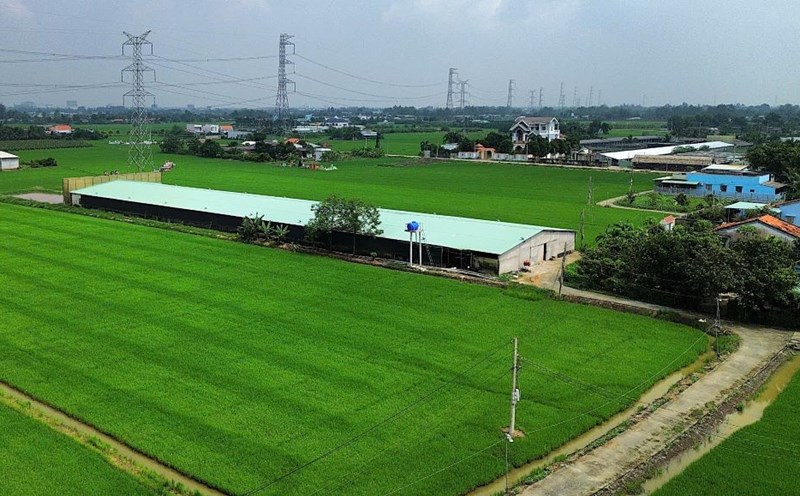Chinese youth are experiencing a new job trend called "full-time children", amid rising youth unemployment rates, the South China Morning Post reported. Accordingly, instead of finding a regular job, full-time children are hired by their parents to take care of family members and do housework, in order to receive a monthly allowance from their family.
A group on the Chinese social networking platform Douban called "Media Center for Full-Time Parents" attracts about 4,700 members, who often discuss stories surrounding work. their daily home. Meanwhile, on Xiaohongshu, a platform in China similar to Instagram, the hashtag "full-time boys and girls" recorded more than 3.1 million interests and interactions.
The trend of working for parents is increasingly popular in China, attracting many young people. According to experts, this type of work has the advantage of helping reduce the burden on China as its population ages.
Not freeloading at all
Experts say full-time parenting is not necessarily a new phenomenon. In the 2000s, there appeared a generation of young people called "the generation that feed off the old", or "ken lao" in this country. These are young people with 3 no's: Not going to school, not having a job or not participating in vocational training. However, experts also reject the notion that the current trend of full-time parenting is a revival of the old "parasitic" generation.
The important difference is that the current generation considers taking care of parents as a professional job, so they always try their best and wholeheartedly devote themselves to their "childcare career".
Describing the role of being a full-time child, one young person said: “You have to always be on duty, answering calls and messages from parents anytime, anywhere. Never say no, even to the smallest things. Always talk to them and thoughtfully hug and hold hands to show affection. Proactively make peace if disagreements occur."
Nianan, a 40-year-old woman who is a full-time daughter, said her daily routine includes an hour of dancing with her parents in the morning, going to the market with them and cooking dinner. In addition, she also repairs electrical appliances in the house, works as a driver and organizes one or two outings for the whole family every month.
In return, Nianan receives about 4,000 yuan per month (equivalent to 14 million VND), lower than the average salary of about 6,000 yuan (equivalent to 21 million VND). However, this is considered a decent middle-class salary in some parts of China.
In general, the average income of young people taking care of their parents ranges from 3,000 to 6,000 yuan (about 10.5 to 21 million VND), this number can change depending on the degree of generosity. the liberation of the ancestors.
The labor market is highly competitive
In a country with a highly competitive labor market like China, with 11.79 million college graduates entering the workforce in 2024 alone, young people see it as a job to take care of their parents. Full-time mothers are an option that helps them escape the pressure of finding a job in the context of fierce competition for job opportunities .
In 2023, the unemployment rate among the 16-24 age group increased for six consecutive months, reaching a record high of 21.3% in June.
However, not all young people who work full-time have the mindset of giving up. Many still spend their free time studying for graduation exams or civil service exams - exams that are notoriously fierce. in this country.
A girl shared on social network Douban that she spent 3 years working for her parents and finally passed the public school teacher recruitment exam. She wrote: "The past three years have been very long, with the struggle to make choices, the uncertainty about the future, but fortunately to have unconditional support from my family."
Not a sustainable employment solution?
China is facing a rapidly aging population, and one potential benefit of full-time parental care is that it could alleviate some of the pressure caused by the demographic crisis. for the country's social services.
Data shows that over the next decade, nearly a third of China's population (equivalent to 400 million people) will no longer be of working age.
"In China, parents are more emotionally dependent on their children," said researcher Liu Wenrong of the Institute of Sociology at the Shanghai Academy of Social Sciences, in an interview with online news outlet Sixth Tone. , while children are more financially dependent on their parents."
However, experts warn that full-time parental care is not a sustainable solution to underemployment and a growing aging population.
"My important reminder to parents is that you must encourage your children to go out into society or you will destroy them," educational researcher Chen Zhiwen said in an interview. .
In the context of long-term cohabitation, disagreements and tensions will inevitably arise between parents and their full-time children.
A full-time daughter faced frustration from her parents after 6 months of working from home. “I have not passed the postgraduate exam, nor have I found a job in the State, and I am struggling to find a job. At age 25, I'm still single. What have I done myself? While my friends are all far ahead of me."
CNN quoted Sociology Professor Ya-wen Lei of Harvard University, saying she predicted the trend of professional parenting would not last long. “The support they receive from their parents in this context is not surprising, as many Chinese parents support their children in many aspects of life, such as housing, expenses get married and take care of the children," the professor said, adding that most young people are eventually able to find jobs.
According to George Magnus, research associate at the China Center at Oxford University and SOAS University London, this is not a viable solution to the employment problem in China. He analyzed that if young people do not participate in the labor market to hone their skills and find better opportunities, they may become unemployed, and if unemployed for too long they cannot keep up with demand. high of work.











